What Are the Differences in the Reading Sections in Act and Sat
You've probably heard of the Act and SAT, but how unlike are these ii tests really In this extensive ACT vs Saturday analysis, we look at the top 11 differences between the Human activity and Saturday and explicate what these differences mean for you. And to conclude, we give you tips on how to make up one's mind whether y'all should take the ACT or SAT. At a glance, the two tests aren't that different. Both the ACT and SAT are nationally recognized standardized tests and common admission requirements for US schools. Catering primarily to high school juniors and seniors, each test measures students' proficiency in various critical skill areas—such as trouble solving and reading comprehension—that are necessary for college success. Considering all US colleges and universities take scores from either the Human action or SAT, there'due south no advantage in taking i test over the other. This means you tin apply to the aforementioned schools, regardless of which test yous determine to take. But what about the actual content of the two tests? Though not identical, the ACT and SAT are more than closely related than ever before as a outcome of the Saturday's massive redesign in 2016. At present, both exams have the following features: Despite all these similarities, at that place are nevertheless many ways in which the Human action and SAT differ from each other. For i, the SAT is overall slightly longer than the Act. What's more, the number of questions and time limits are different for corresponding sections. Here is a brief overview of the basic structural and logistical differences between the Deed and Sat: Act SAT Total Time Order of Sections Fourth dimension Per Section # of Questions Scoring Total score range: 1-36 Each section uses a scale of ane-36. Your total score is the average of your four section scores. The optional Writing section uses a scale of two-12 and does not count toward your final score. Total score range: 400-1600 The Show-Based Reading and Writing (EBRW) and Math sections each use a scale of 200-800 and are combined for a total score. Cost Who Accepts Scores? Accustomed by all colleges and universities in the US Accepted by all colleges and universities in the US And then are these the only means in which the ACT and Sat differ? Not at all! In fact, the two tests differ quite significantly in 11 key ways. Read on to see what these differences are and what they ultimately hateful for you. Now, let's begin our ACT vs Sat comparison. Although both tests share several similarities, hither are the about important differences for you to consider before deciding whether to take the Saturday or Act. Loathe time crunches? So you might adopt the Sabbatum over the ACT. This is consideringthe Sabbatum gives you more fourth dimension per question than the Deed does. This nautical chart illustrates the differences in fourth dimension per question (if you were to spend the aforementioned corporeality of time on each question in a given section): As yous can meet, the SAT offers more time per question on all sections of the test. You'll have some of the biggest increases in time per question on the SAT Math and Reading sections, with the Math Computer subsection allotting you nearly 30 seconds more per question than the ACT Math department! So if you're worried about time management, specially on math questions, the Sat offers much more workable and far less stress-inducing time constraints than the ACT does. Another major difference has to practise with scientific discipline. While the ACT contains a section entirely devoted to science, the Saturday does not. Looking above at our chart of differences, we can encounter that the Human activity Science section contains 40 questions and lasts 35 minutes. Similar the other three ACT sections, Scientific discipline constitutes one-fourth of your total Act score. So if you're a science whiz who loves the idea of having an unabridged section focused on scientific data, graphs, and hypotheses, the ACT might be a amend fit for yous. That being said, the Saturday does test scientific concepts—just non through a separate Science section. On the Sat, yous'll occasionally run across questions dealing with scientific passages, data, and charts on the Reading, Writing, and Math sections. Here's an instance of a science-based SAT Reading passage you could run into on test 24-hour interval: As you probably know, at that place'due south no Scientific discipline score on the Saturday as in that location is on the Human action, simply there is anAnalysis in Science cross-exam score, which isone of the many subscores given on the SAT. That said, most schools won't pay much (if any) attention to your SAT subscores, whereas they will take into consideration your Human action Scientific discipline score. Unlike the Human action for which you may use a calculator on all Math questions, the Sat contains a Math "No Calculator" subsection for which y'all may not use a calculator. Consisting of xx questions, the No Figurer subsection is a mere 25 minutes long, making it the shortest section on the SAT. (By contrast, the Math Estimator subsection is 55 minutes long and consists of 38 questions.) As a result, if you struggle with solving math rapidly or without a figurer, you lot'd probably fare better on Human activity Math than you would on SAT Math. On the other hand, if you're confident in your math skills and can work fast without a reckoner, the Sabbatum is a solid choice. Know this, though: on both the ACT and Saturday, you can technically solve all math questions without a reckoner.So, actually, the No Reckoner questions aren't all that dissimilar from Calculator questions. That said, the No Calculator questions are meant to exist easier to solve without a calculator and are thus generally more reasoning-based than arithmetics-heavy. In regard to math content, the ACT and SAT both have a big accent on algebra. But the Deed too tests a couple of concepts that the SAT doesn't focus on as much. To start, the ACT has a much larger focus on geometry, which makes upwardly about xxx-45% of ACT Math. By contrast, geometry accounts for less than 10% of Sat Math questions. In addition, trigonometry accounts for nigh 7% of the Human action but less than 5% of the SAT, so there'due south a slightly larger emphasis of trig on the ACT than there is on the Sat. The ACT as well tests a few concepts that the SAT doesn't test at all. These include things such equally matrices, graphs of trig functions, and logarithms. So what does all this mean for yous? If you're good at algebra and data analysis, y'all'll probable do well on the Sabbatum. But if you're a fan of trig functions and geometry and are comfortable with matrices and logs, the ACT is a better choice. Here's another math-related difference: the SAT provides y'all with a diagram of math formulas, whereas the ACT does not. Earlier the 2 Sabbatum Math subsections, you'll be given a diagram containing 12 geometry formulas and iii laws: Although all these formulas and laws pertain to geometry—which, as you lot now know, doesn't make upward a huge part of the Sabbatum—having this diagram handy ways y'all won't need to spend a ton of time memorizing formulas beforehand (though you should accept intendance to memorize some important formulas not included in the diagram). Unlike the SAT, the Act doesn't give y'all whatever formulas on test 24-hour interval, meaning you absolutely mustmemorize all potential formulas earlier taking the test. In short, if you're concerned you might forget certain formulas, the SAT offers a little more of a crutch than the Deed does. How big of a function volition Math play in your final score? The answer to this question depends on whether you're taking the ACT or Saturday. On the Deed, Math accounts for one-fourth of your full score (your Math department score is averaged with your other iii section scores). On the SAT, however, Math accounts for half of your full score, making it twice equally important on the SAT! So if math isn't your strong adapt, consider opting for the Deed. With the Deed, a lower Math score won't negatively affect your total score as much equally it will on the Sabbatum. To illustrate this more than clearly, let'south look at an instance. If I were to score in similar percentiles on the ACT and SAT—with significantly lower Math section scores—you might retrieve that my full percentiles on both exams would be nearly the same. But equally you tin encounter below, this isn't the example. ACT percentiles: As this instance indicates, even if I were to score in similar percentiles on every section of the ACT and Saturday (with lower Math section scores on each exam), my composite score percentiles would differ dramatically. In this case, my final ACT percentile is xx% higher than my Sat percentile. In other words, if math isn't one of your strengths, you'll have a better shot at hitting the total percentile you lot desire on the Act than you will on the SAT. The two tests also differ in the number of reply choices they give you lot on Math. Both the Sat and Human action Math sections are predominantly multiple choice. But while ACT Math gives you five possible respond choices (A-E or F-1000) for each question, SAT Math just gives you lot 4 (A-D). Every bit a reminder, both tests utilize rights-simply scoring, meaning you'll never lose a indicate for an wrong answer. So if you were to estimate on an SAT Math question, you lot'd have a 25% chance of getting the question right. Merely if you were to approximate on an Act Math question, y'all'd have only a 20% adventure of getting it right. Therefore, if yous think you might need to gauge on Math, know that the Sabbatum offers a very slight advantage over the ACT, with a 5% higher probability of getting a question correct. If you love multiple choice, particularly when it comes to math questions, yous might desire to stick with the Act. The Sat, though mostly multiple choice, has pupil-produced response questions, or grid-ins , which are math questions for which yous must fill in your own reply. In other words, y'all'll have no answer choices from which to cull on these questions! Grid-ins business relationship for 22% of SAT Math, or 13 total questions across the No Calculator (five grid-ins) and Figurer (8 grid-ins) subsections. By contrast, Human activity Math merely has multiple-option questions. If you lot're non a fan of math questions that don't offer y'all whatever answer choices, the Human activity is the superior pick. Are you good at pinpointing areas in texts to support your answers to questions? If so, the Sat might exist a improve fit for you. Evidence-support questions are a big role of Sat Reading but are entirely absent on Act Reading. These questions build off of the questions that come before them and ask you to cite specific lines or paragraphs as show for your answer to a previous question. Here'southward an example of an testify-support question (with the question to which it's referring): Our guide discusses in more than particular the different types of evidence questions you'll encounter on SAT Reading. Evidence questions can exist somewhat tricky, specially if you're non sure where you institute your answer in the passage. If you're non into the idea of interconnected questions, try the ACT instead (whose Reading questions are always split from ane another). On Sabbatum Reading, all questions given to y'all follow a chronological society—that is, in the order of the passage to which they refer. But on Deed Reading, questions can flow randomly and do not routinely follow the order of the content in the passages. Here's an example of ii Sat questions, which you can see progress in the guild of the passage (as indicated past the line numbers in both questions): And now here is an example of 2 ACT questions, which do not progress in the society of the passage (as indicated past the line number and mention of "last paragraph"): As a event, Saturday Reading questions are mostly easier to follow and thus easier to answer than ACT Reading questions. Chronologically ordered questions can as well save you time on the SAT, as you won't need to search the entire passage for the surface area to which a question is referring. The terminal major departure between the two tests deals with the optional essay. On the Human activity, there is an essay component that you can choose to have; however, as of summer 2021, the SAT volition no longer offer an extra essay. If yous cull to take the essay portion of the Deed, y'all'll read a brusque passage about an issue and and then clarify the unlike perspectives on this issue. Then, yous'll also give your own stance on the effect discussed in the passage. Here's an case of an ACT Writing prompt: For this optional writing section you'll not but demand to accept good reading comprehension skills in order to fully realize the strengths and weaknesses of the author'south argument, simply you'll need strong rhetorical skills too. So, if you decide to take this portion of the ACT, you need to be able to effectively compare and dissimilarity unlike perspectives on an result as well as requite aplenty testify to support your opinion. At last, it's time to enquire yourself: which test is right for y'all—the ACT or SAT? Hither are three ways to assistance yous brand your decision. Instead of just guessing whether you'll be ameliorate at the ACT or SAT, the best mode to decide is to really take each test and then compare your scores. To practice this, you'll need to find an official practice test for both the ACT and SAT. Official practice tests are the closest y'all can get to the real deal. Hither at PrepScholar, we've got all official SAT practice tests and Act do tests compiled for your convenience. Hither's what you'll do: cull 1 official practise examination for each test and then decide on the days you'll take them. Every bit a reminder, each test takes approximately four hours, so make sure you set aside plenty time to consummate each test without intermission. Do not take the tests on the aforementioned day or fifty-fifty ii days in a row. In addition, brand sure that you're taking the tests in a placidity place and are timing yourself appropriately (equally y'all would exist timed on the actual exams). Once you lot've completed both practice tests, calculate your Human action and SAT scores using your practice tests' respective scoring guides and then compare your scores. The easiest way to compare your scores is to catechumen your total ACT exam score to a full Sabbatum exam score using our handy conversion organization. Alternatively, you can compare percentiles for your ACT and SAT scores to see on which test your percentile was higher. In the finish, whichever test yous scored higher on is the i you should ultimately prep for and employ for college admissions. If your ACT and Sat scores are nearly or exactly the aforementioned, y'all'll probably perform equally well on either test. And so it'southward up to you lot, then, to decide whether you'd like to try taking both tests, or whether you'd prefer to accept just ane. For more information, read our guide on who should consider taking both the Deed and SAT. Another way you tin determine which test is right for yous is to take a curt quiz. In the chart below, bank check whether you agree or disagree with each argument. Statement Agree Disagree I struggle with geometry and trigonometry. I am good at solving math problems without a calculator. Science is not my forte. Information technology's easier for me to analyze something than to explain my opinion. I normally do well on math tests. I tin't recall math formulas easily. I like coming up with my own answers for math questions. Tight fourth dimension constraints stress me out. I can easily find show to support my answers. Chronologically bundled questions are easier to follow. Now, count upwards your cheque marks in each column to find out what your score means. Mostly Agrees — The Sabbatum is your lucifer! If you agreed with virtually or all of the to a higher place statements, the SAT is what you've been looking for. With the Saturday, you'll accept more than fourth dimension for each question and won't demand to deal with a pesky science section or a ton of geometry questions. Mostly Disagrees — The ACT's the one for you! If yous disagreed with nigh or all of the statements, you'll most probable prefer the ACT over the Saturday. On the Deed, yous'll never have to come up up with your own answers to math problems, and you go to let your stance shine in your writing. Equal Agrees and Disagrees — Either test will work! If you checked "Hold" and "Disagree" an equal number of times, either the Act or Sat will suit you. Unless you make up one's mind to have both, I propose taking official Act and Saturday practice tests (as described in #i above) to come across which test'due south format y'all're ultimately more comfortable with. Lastly, don't forget to find out whether your state has any specific testing requirements. Some states require all loftier school students to take the ACT or Sat. In these cases, it'due south usually best to stick with whatever test is required for your state so that you don't need to report for the other test, too. There are 11 states that require the Deed: In addition, Idaho, Ohio, Oklahoma, and Tennessee require a exam every bit part of the graduation procedure, only these states let yous to cull the Sabbatum or the Act. Want more comparisons of the Deed and Saturday? Cheque out our handy Saturday vs ACT comparison charts, and get info on whether the ACT is actually easier than the Saturday. Not sure what scores to aim for? Read our step-by-step guides to learn how to prepare a goal score for the Sat or Act. If you're a loftier achiever, why not become straight for a perfect 1600 on the SAT or a full 36 on the ACT? Desire to better your SAT score by 160 points or your Deed score by 4 points? Check out our best-in-grade online SAT and Act prep classes. We guarantee your money back if you don't improve your Sabbatum score by 160+ points or your ACT score past 4+ points. Our classes are entirely online, and they're taught by experts. If you liked this article, you'll love our classes. Along with adept-led classes, y'all'll get personalized homework with thousands of practice issues organized by individual skills then y'all learn nearly finer. We'll also give you a stride-by-stride, custom program to follow and then yous'll never be dislocated nigh what to written report next. Try it take chances-free today: 
ACT vs SAT: How Unlike Are They?
two hrs 55 mins without Writing
3 hrs 35 mins with Writing3 hrs total 1. English
2. Math
three. Reading
4. Science
v. Writing (optional)ane. Reading
2. Writing and Language
3. Math No Estimator
4. Math Calculator English language: 45 mins
Math: lx mins
Reading: 35 mins
Scientific discipline: 35 mins
Writing (optional): forty mins Reading: 65 mins
Writing and Language: 35 mins
Math No Calculator: 25 mins
Math Estimator: 55 mins English language: 75 questions
Math: 60 questions
Reading: 40 questions
Scientific discipline: 40 questions
Writing (optional): 1 essay Reading: 52 questions
Writing and Language: 44 questions
Math No Calculator: 20 questions
Math Calculator: 38 questions $60 without Writing
$70 with Writing$52 
Sat vs ACT: 11 Key Differences
#1: Time Per Question
ACT SAT Reading 53 sec/question 75 sec/question ACT English/SAT Writing 36 sec/question 48 sec/question Math lx sec/question No Figurer: 75 sec/question
Calculator: 87 sec/question Science 53 sec/question N/A #2: Scientific discipline Section
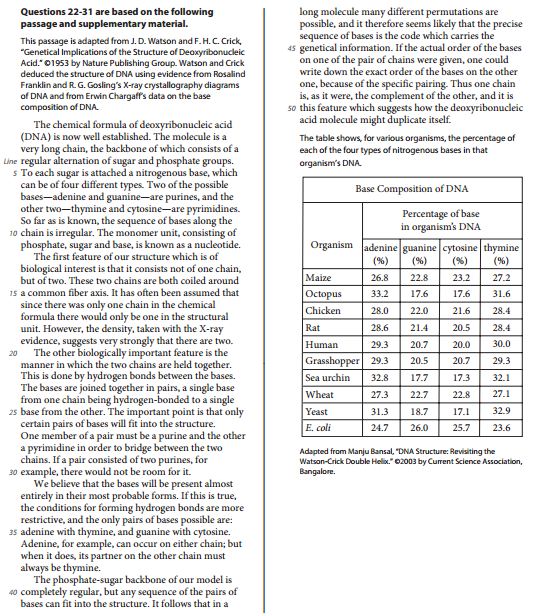

#iii: No Calculator Math Subsection
#4: Types and Balance of Math Concepts
#5: Math Formulas Reference Guide
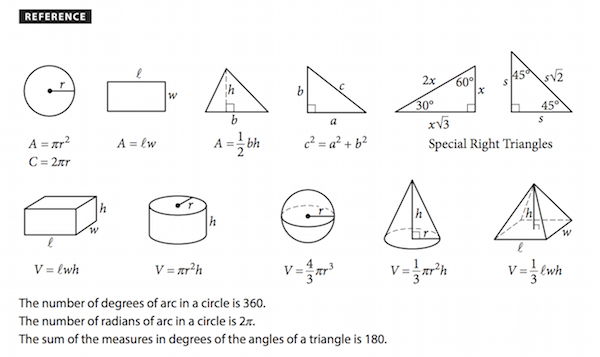

#half dozen: Importance of Math in Terminal Score
Sabbatum percentiles:
#vii: Number of Answer Choices on Math
#viii: Grid-In Math Questions

#9: Prove-Support Reading Questions
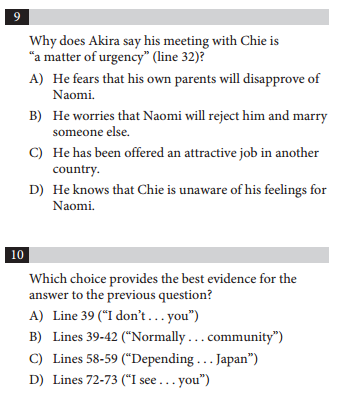
#10: Chronological Reading Questions
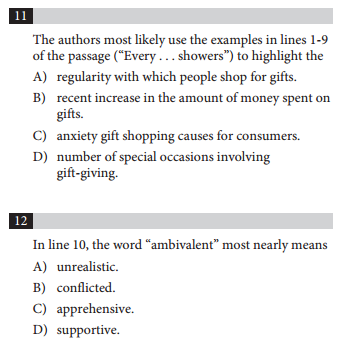
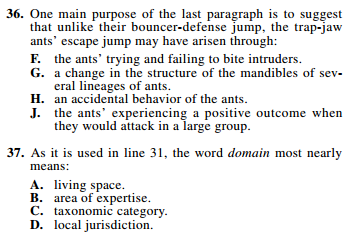
#11: Optional Essay
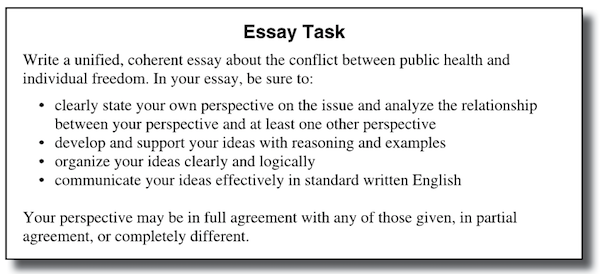

Deed vs SAT: Which Test Is Right for You lot?
Method 1: Take Official Practice Tests
Method 2: Take an Sat vs Act Quiz

Method iii: Consider Your State'southward Testing Requirements
And there are 10 states/regions that crave the Sabbatum:

What's Next?



About the Author
Hannah received her MA in Japanese Studies from the Academy of Michigan and holds a available's caste from the University of Southern California. From 2013 to 2015, she taught English in Japan via the JET Programme. She is passionate near education, writing, and travel.
Source: https://blog.prepscholar.com/act-vs-sat
0 Response to "What Are the Differences in the Reading Sections in Act and Sat"
Post a Comment